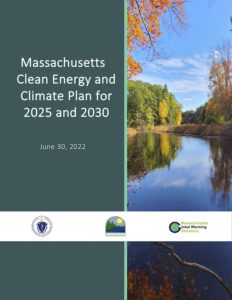Who is a member?
Our members are the local governments of Massachusetts and their elected and appointed leadership.
 Energy and Environmental Affairs Secretary Beth Card today released the state’s “Clean Energy and Climate Plan for 2025 and 2030,” which establishes an economy-wide emissions limit representing a 33% reduction from 1990 levels in 2025, and a 50% reduction in 2030.
Energy and Environmental Affairs Secretary Beth Card today released the state’s “Clean Energy and Climate Plan for 2025 and 2030,” which establishes an economy-wide emissions limit representing a 33% reduction from 1990 levels in 2025, and a 50% reduction in 2030.
The 2025/2030 CECP represents the Commonwealth’s comprehensive plans to achieve aggressive emissions reduction in 2025 and 2030. According to the Executive Office of Energy and Environmental Affairs, the plan “is rooted in the understanding that climate change poses a unique and potentially irreversible threat to the well-being of society.”
The plans for 2025 and 2030 “maximize the ability to realize a 2050 future in which the heat in homes, power in vehicles, and electric grid can all operate with a minimum reliance on fossil fuels, and natural and working lands can be protected from conversion and better managed and restored to enhance carbon sequestration.”
The 2025/2030 CECP “exhibits the confidence that Massachusetts can help lead the clean energy transition and that doing so will mean more well-paying jobs, improved public health, reduced consumer costs, and better quality of life for all residents.” Economic analysis performed during the plan’s development estimates that the 2025/2030 CECP will result in a net gain of more than 22,000 jobs by 2030, with 95% of those clean energy jobs paying wages of more than $26 per hour.
Secretary Card wrote that the plan “prioritizes actions within several sectors of the economy to close the gap between current emissions and future emissions targets. These initiatives include the implementation of the California vehicle emissions standards to advance the electrification of cars and trucks; increasing electric vehicle charging infrastructure while expanding investments in the public transportation system; pursuing recommendations from the Commission on Clean Heat to transform how homes and businesses are heated; doubling the state’s efforts to conserve natural and working lands; and significantly expanding tree planting, especially in environmental justice neighborhoods.”
Chapter 8 of the Acts of 2021, An Act Creating a Next-Generation Roadmap for Massachusetts Climate Policy, requires the secretary of Energy and Environmental Affairs to set interim emissions limits and sector-specific sublimits every five years. The law set July 1, 2022, as the deadline for the adoption of the 2025 and 2030 emissions limits and sublimits, as well as the release of a comprehensive plan to achieve those limits.
Visit the Clean Energy and Climate Plan website for more information.